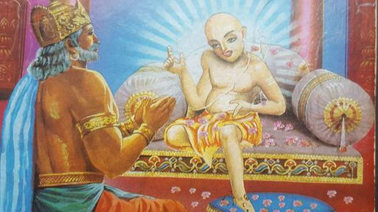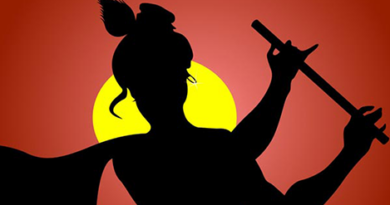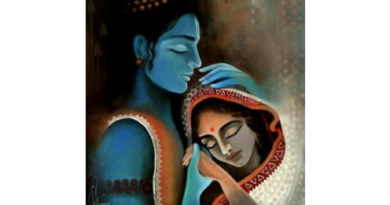THE EIGHT TWISTS
There are many characters mentioned by the great Vyasa in the Mahabharata who do not form the main stream plot. Yet, their presence makes a great difference to the entire epic. They portray many morals some of which are very crucial to follow.
Uddalaka was a great scholar of his times. He was proficient in the Vedas and Upanishads. His prolific teaching ability had made him a teacher of highest order in Vedanta. In the order of his disciples, he had both good and dull. But that didn’t deter him. He preached the same value system for both the categories. Amongst his group of pupils, was the virtuous and devoted Kagola. Even though he was a slow learner and lacked the ability to become an erudite scholar, his good conduct earned him, his teacher’s mercy. He gave his daughter Sujata in marriage to him.
In the course of time, Sujata had conceived. Kagola’s learning continued. The baby in the womb was different. He was divinely ordained. He had inherited his grandfather’s qualities. He was wise and was already being acquainted to learning of Vedas in the womb. Each time, his father Kagola uttered a wrong meaning to the word, the baby would twist his body wincing in pain. Totally, he had about eight crooks in his body when he was born.
He was named Ashtavakra.
The little boy Ashtavakra grew up to be an erudite scholar. By the age of twelve, he had mastery over knowledge. He was all ready to challenge scholars.
One day, he heard the news of King Janaka performing a sacrificial fire at his court in Mithila. Those were the occasions when great scholars of times would meet and argue on matters relating to the Vedas. He decided to proceed towards Mithila.
When he entered the gargantuan province, he remembered his father, Kagola. With tears in his eyes, he walked past the great gardens and stood at the entrance of the palace. Irked by his tender age, the guards resisted to allow him inside the palace which was now adorned by renowned scholars.
“This court is now embellished by distinguished scholars from across the world. There is no time for a little boy like you to waste. What do you possess to be a part of this assembly?” Questioned the guard.
“I am not a little boy. I have accomplished my vows in the Vedic literature from my guru, Uddalaka. It is his wish that I participate in this session. You must allow me in,” Ashtavakra implored.
“There is no time to waste because knowledge doesn’t materialize in entirety at this tender age. You will end up humiliated. I warn you,” the guard instructed.
“You should not determine my ability by my looks and my size. Size has never been an indicator of knowledge. A gigantic man may be an ordinary fool. Age alone does not prove the ripeness of knowledge. I am here to challenge your court scholar Vandi. Inform this to your King and let me in,” said Ashtavakra.
Left with no choice, the guard let the boy in.
His age and appearance nerved the King. He was unsure about the boy’s great ambition. He worried a little.
The King said, “Dear boy, Vandi has defeated many scholars in the past. He overthrew them in an argument causing them to drown in the waters of the ocean. Does this not daunt your courage?”
Ashtavakra replied like a lightening, “Dear King, your court scholar was responsible for my father to drown in the ocean. I have come here to avenge his death. Yet, I believe that he has not met an erudite scholar like me. He may have defeated ordinary ones. Let him try to vanquish me. I have no doubt that I will defeat him and drown him into the ocean just like how he did to my father.”
Appalled by the courage displayed by the little boy at such tender age, the King decided to test his skill.
Vandi was summoned.
Ashtavakra stood like a lion in front of Vandi. He tried to warn the boy but his words seldom reached his ears. Ashtavakra came with the great ambition of destroying his ego. He was sure to succeed.
The assembly hall was excited to watch the great verbal battle. They discussed uncertain texts and started arguing. The hall was amazed by the ripened speech of the boy. The assembly undoubtedly declared Ashtavakra as the winner.
Vandi accepted defeat and drowned himself in the ocean.
Ashtavakra had brought peace to his father’s soul.
While I completed writing this chapter, my mind brought out these thoughts specifically: There are times, we are judged wrongly. Taking heed of it all makes us desolate and miserable. Hence, it is always important to remember that your strength is unfathomable and unfailing. Courage and benevolence can make a hero. It is highly suggested that the greatness of man should not be judged by age and physical appearance alone. One must try to look beyond it.
Who knows, we may have many Ashtavakras living amidst us.!
(This episode was narrated to Yudhishtira by Lomasa while the Pandavas were on exile.)





Good story from purana . . No body should get discouraged by their physical weakness. Ashtavakra should be a role model for persons with physical weakness.
Just read the eight twists. Now I know how astavakra came into existence. Fantastic write up and a great conclusion. Keep up the good work… looking forward for many more unknowns…
I wanted to thank you for this excellent read!! I definitely loved every little bit of it. I have got you book-marked to look at new stuff you postÖ